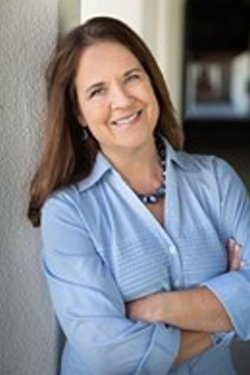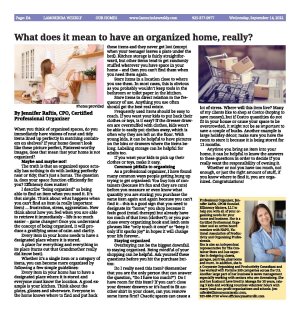| | Published September 14th, 2022
| What does it mean to have an organized home, really?
| | | By Jennifer Raftis, CPO, Certified Professional Organizer |  | | Professional Organizer, Jennifer Raftis, CPOr founded Efficiency Matters, LLC to help you with all of your organizing needs for your home and business. She is a Certified Professional Organizer and an active board member with NAPO, National Association of Productivity and Organizing Professionals. She is also an independent representative for The Container Store and has expertise in designing closets, garages, pantries, playrooms and more. In addition, she is a Corporate Organizing and Productivity Consultant and has worked with Fortune 500 companies across the U.S. Another large part of her business is move management especially working with seniors who are downsizing. She and her husband have lived in Moraga for 30 years, raising 3 kids and working countless volunteer hours with many local non-profit organizations and schools. Jennifer@efficiencymattersllc.com, 925-698-3756 www.efficiencymattersllc.com |
When you think of organized spaces, do you immediately have visions of neat and tidy items lined up perfectly in matching containers on shelves? If your home doesn't look like these picture perfect, Pinterest-worthy images, does that mean that your home is not organized?
 Maybe and maybe not!
Maybe and maybe not!
 The truth is that an organized space actually has nothing to do with looking perfectly neat or tidy; that's just a bonus. The question is, does your space function efficiently for you? Efficiency does matter!
The truth is that an organized space actually has nothing to do with looking perfectly neat or tidy; that's just a bonus. The question is, does your space function efficiently for you? Efficiency does matter!
 I describe "being organized" as being able to find an item when you need it. It's that simple. Think about what happens when you can't find an item (a really important item) ... frustration, stress, aggravation. Now think about how you feel when you are able to retrieve it immediately - life is so much easier - game changer! Once you understand the concept of being organized, it will produce a gratifying sense of calm and clarity.
I describe "being organized" as being able to find an item when you need it. It's that simple. Think about what happens when you can't find an item (a really important item) ... frustration, stress, aggravation. Now think about how you feel when you are able to retrieve it immediately - life is so much easier - game changer! Once you understand the concept of being organized, it will produce a gratifying sense of calm and clarity.
 Every item in your home needs to have a designated place where it is stored.
Every item in your home needs to have a designated place where it is stored.
 A place for everything and everything in its place (turns out that Grandmother really did know best).
A place for everything and everything in its place (turns out that Grandmother really did know best).
 Whether it's a single item or a category of items, you can become more organized by following a few simple guidelines:
Whether it's a single item or a category of items, you can become more organized by following a few simple guidelines:
 Every item in your home has to have a designated place where it is stored and everyone must know the location. A good example is your kitchen. Think about the plates, glasses and silverware. Everyone in the home knows where to find and put back these items and they never get lost (except when your teenager leaves a plate under the bed). Kitchen storage is fairly straightforward, but other items tend to get randomly stuffed wherever you have space in your home - and then you can't find them when you need them again.
Every item in your home has to have a designated place where it is stored and everyone must know the location. A good example is your kitchen. Think about the plates, glasses and silverware. Everyone in the home knows where to find and put back these items and they never get lost (except when your teenager leaves a plate under the bed). Kitchen storage is fairly straightforward, but other items tend to get randomly stuffed wherever you have space in your home - and then you can't find them when you need them again.
 Store items in a location close to where you use them. In most cases, this is obvious as you probably wouldn't keep tools in the bathroom or toilet paper in the kitchen.
Store items in a location close to where you use them. In most cases, this is obvious as you probably wouldn't keep tools in the bathroom or toilet paper in the kitchen.
 Store items in direct relation to the frequency of use. Anything you use often should get the best real estate.
Store items in direct relation to the frequency of use. Anything you use often should get the best real estate.
 Frequently used items should be easy to reach. If you want your kids to put back their clothes or toys, is it easy? If the dresser drawers are overstuffed with clothes, kids won't be able to easily put clothes away, which is often why they are left on the floor. With young kids, it can be helpful to have pictures on the bins or drawers where the items belong. Labeling storage can be helpful for adults too.
Frequently used items should be easy to reach. If you want your kids to put back their clothes or toys, is it easy? If the dresser drawers are overstuffed with clothes, kids won't be able to easily put clothes away, which is often why they are left on the floor. With young kids, it can be helpful to have pictures on the bins or drawers where the items belong. Labeling storage can be helpful for adults too.
 If you want your kids to pick up their clothes or toys, make it easy.
If you want your kids to pick up their clothes or toys, make it easy.
 Common pitfalls to organizing
Common pitfalls to organizing
 As a professional organizer, I have found many common ways people getting hung up trying to get organized: You buy lots of containers (because it's fun and they are cute) before you measure or even know what quantity you are storing; you purchase the same item again and again because you can't find it - this is a good sign that you need to designate its "home;" you shop because it feels good (retail therapy) but already have too much of that item (clothes?); or you purchase every organizing book and latch onto phrases like "only touch it once" or "keep it only if it sparks joy" in hopes it will change your life forever..
As a professional organizer, I have found many common ways people getting hung up trying to get organized: You buy lots of containers (because it's fun and they are cute) before you measure or even know what quantity you are storing; you purchase the same item again and again because you can't find it - this is a good sign that you need to designate its "home;" you shop because it feels good (retail therapy) but already have too much of that item (clothes?); or you purchase every organizing book and latch onto phrases like "only touch it once" or "keep it only if it sparks joy" in hopes it will change your life forever..
 Staying organized
Staying organized
 Overbuying can be the biggest downfall to staying organized. Being mindful of your shopping can be helpful. Ask yourself these questions before you hit the purchase button:
Overbuying can be the biggest downfall to staying organized. Being mindful of your shopping can be helpful. Ask yourself these questions before you hit the purchase button:
 Do I really need this item? (Remember that you are the only person that can answer the question, "Do I have too much?") Do I have room for this item? If you can't close your dresser drawers or it's hard to fit another shirt in your closet, can you remove some items first? Chaotic spaces can cause a lot of stress. Where will this item live? Many of my clients like to shop at Costco (hoping to save money), but if Costco quantities do not fit in your house or cause your space to be overcrowded, it might not be as important to save a couple of bucks. Another example is large holiday décor; make sure you have the room to store it because it is being stored for 11 months.
Do I really need this item? (Remember that you are the only person that can answer the question, "Do I have too much?") Do I have room for this item? If you can't close your dresser drawers or it's hard to fit another shirt in your closet, can you remove some items first? Chaotic spaces can cause a lot of stress. Where will this item live? Many of my clients like to shop at Costco (hoping to save money), but if Costco quantities do not fit in your house or cause your space to be overcrowded, it might not be as important to save a couple of bucks. Another example is large holiday décor; make sure you have the room to store it because it is being stored for 11 months.
 Anytime you bring an item into your home, it can be helpful to know the answers to these questions in order to decide if you really want the responsibility of owning it.
Anytime you bring an item into your home, it can be helpful to know the answers to these questions in order to decide if you really want the responsibility of owning it.
 Whether or not you have too much, not enough, or just the right amount of stuff, if you know where to find it, you are organized. Congratulations!
Whether or not you have too much, not enough, or just the right amount of stuff, if you know where to find it, you are organized. Congratulations! |
| | | | | | | | | | | | |



